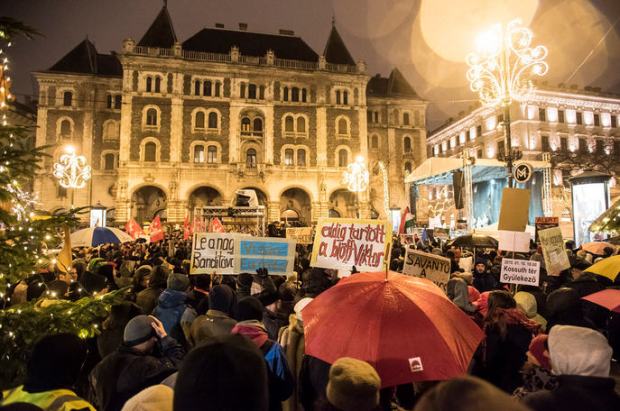The demonstration just ended. I didn’t have a chance to hear all eight speeches, but those I did listen to greatly varied in quality. There were some that demonstrated political naivete and some that questioned the very notion of a market economy, which was described as a system of exploitation. Not surprisingly, the politically most sophisticated speech was delivered by a former politician, Gábor Vágó (LMP). In the speeches of the two organizers of MostMi!, Zsolt Várady and Bori Takács, a frequent refrain was that “we will have to figure out what kind of Hungary we want.” I found this worrisome. It seems that once again Hungarians want to invent something new and unique instead of following the examples of successful democracies that offer their citizens a decent living and security.
According to Abcúg.hu, “this first demonstration of the year was one of the shortest and least eventful of the past few months.” The reporter overheard someone saying that “we have been hearing the same thing over and over,” which is of course true. Speakers complain about the government and about all politicians and parties while the crowd chants “Orbán scram!” The demonstrations, quite frankly, are becoming boring. But the trouble is that the organizers have no idea how to go beyond demonstrations, how to elect a new government, how to create the idyllic Hungary they would like to see after the fall of Viktor Orbán.
There was one speaker, Bernadette Somody, a lawyer who is the director of the legal think tank Károly Eötvös Institute, who pointed out some practical problems facing those who are dissatisfied with the present political situation. In order to rid Hungary of the whole system, the politicians who take over after the fall of the Orbán government must cleanse the government edifice of Orbán appointees. But that will be exceedingly difficult because Viktor Orbán made sure that most of the appointments are of very long duration.
Otherwise, the speeches were full of vague notions about the full participation of citizens at every level of decision-making. A politically engaged citizenry will discuss every issue. Politicians will not be able to make decisions without their approval. I guess I don’t have to elaborate on the impossibility of creating a large-scale participatory democracy in today’s world.
I was greatly disappointed in László Kálmán, He showed a surprising lack of knowledge about anything practical. He said, for instance, that one needs neither a centralized nor a community-based school system. Parents will get together and establish their own. There is a saying in America about those academics who “can’t even tie their own shoe laces,” meaning they are singularly impractical. Well, Kálmán seems to be one of them.
Although it is a welcome development that there is a growing awareness of widespread poverty and sympathy for the poor, the two speakers speaking for the homeless talked in quasi-Marxist terms that poor Marx wouldn’t recognize. In Hungarian this kind of primitive Marxism is called “vulgár marxizmus.” These speakers talked about the poverty that is inseparable from the capitalist system. There was a lot of talk about exploiters and exploitation. Once the present system is gone, they suggested, there will be an “even distribution” of goods. Another hopeless idea.
And the biggest problem of all: the rejection of party politics. One of the speakers, unfortunately I forget which one, announced that “we don’t need parties but a new alternative.” He neglected to tell us what this alternative is. Several speakers, Várady and Kálmán for example, found all the parties of the last twenty-five years totally incompetent. I am much more charitable. It’s a lot easier to be a Monday morning quarterback than to be on the field in real time. In 1990 an inexperienced crew took over the reins of government in incredibly hard times. The country had a staggering national debt, the collapse of the socialist economic system led to more than a million people being unemployed, inflation was over 30%. Under these circumstances the new government had to lay the foundations of a democratic regime. On balance, they and their successors didn’t do a bad job. For instance, by 1998 Hungary’s most serious economic problems were over. Yes, they made mistakes, but to say that they botched up everything is simply not true.
The organizers’ anti-party attitude went so far today as to refuse Zoltán Kész, the independent candidate supported by all parties with the exception of LMP in the crucial Veszprém by-election, the opportunity to speak. Péter Krekó of Political Capital, a think tank, rightly pointed out that this was a grave mistake. Kész is not a party candidate. He can be considered a civic-minded citizen, an English teacher in town. His slogan is: vote for me and you vote against the two-thirds majority. This election for Tibor Navracsics’s old seat is important for Fidesz also. The government just gave 800 million forints to the city just to make sure that the voters know who butters their bread. And yet the organizers who are so eager to unseat Viktor Orbán didn’t allow this man to speak. Incredibly short-sighted.
All in all, I don’t know where this movement is going. Let’s just hope it’s not another Occupy Wall Street, which fizzled. I was pleased to hear that a large demonstration is planned for February 2 when German Chancellor Angela Merkel is supposed to visit Budapest. But as long as the opposition remains fractured, as long as people’s dissatisfaction is expressed only in the form of demonstrations and not in political organizing, Viktor Orbán doesn’t have to lose sleep. Foreign pressure might be a different story.

